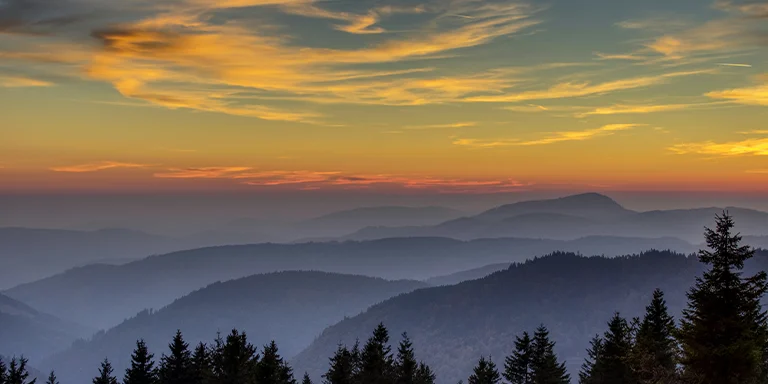

Backpacking in New Hampshire offers the chance to explore stunning natural beauty, from rugged mountain peaks and tranquil lakes to dense forests and cascading waterfalls in the “Granite State.”
In this guide, we’ll share essential tips and the TOP 5 multi-day trails to tackle in New Hampshire. Whether you’re an experienced hiker seeking a new adventure or a novice backpacker eager to embrace the great outdoors, the Granite State has something for every nature enthusiast.
Interested? Let’s get started.
Here are the best multi-day backpacking trails in New Hampshire:

Photo by Craig Zerbe
Length: 31.2 mi / 50.2 km
Type: Loop
Difficulty: Hard
Elevation Gain: 9724 ft / 2964 m
Location: Pemigewasset Wilderness
Estimated Hiking Calorie Burn: 13 600 calories
More Details: See on AllTrails
Extremely rugged 31.2-mile loop in the White Mountains of New Hampshire. Considered very challenging with punishing terrain like exposed Franconia Ridge. Most take 2-3 days. Faces potential winter conditions year-round, so proper gear crucial for safety in this remote area. Limited campsites require reservations. Strenuous climb rewarded with breathtaking ridge views and alpine camping for prepared backpackers.

weesam2010, CC BY-SA 2.0, via flickr
Length: 18 mi / 29 km
Type: Point to point
Difficulty: Hard
Elevation Gain: 8182 ft / 2494 m
Location: White Mountain National Forest
Estimated Hiking Calorie Burn: 11 000 calories
More Details: See on AllTrails
Extremely challenging 18.0-mile Presidential Traverse across New Hampshire’s highest, exposed alpine summits including Mount Washington. Recommended as a strenuous 2-3 day backpacking trip for experienced hikers only. Faces severe weather potential year-round. Proper mountaineering gear essential. AMC huts with reservations. Check forecasts for this iconic but punishing White Mountains adventure.

Harold Litwiler, CC BY-SA 2.0, via flickr
Length: 17.5 mi / 28.1 km
Type: Out and back
Difficulty: Hard
Elevation Gain: 3018 ft / 920 m
Location: Pemigewasset Wilderness
Estimated Hiking Calorie Burn: 7300 calories
More Details: See on AllTrails
Challenging 17.5-mile out-and-back to Owl’s Head summit in White Mountains near Lincoln, NH. Strenuous 8-hour hike climbing Franconia Brook and Lincoln Brook Trails to Owl’s Head Path. Two brook crossings required. Best views before wooded summit. Popular backpacking route with possible mud/overgrowth. Rewarding but arduous climb reaching cairn-marked peak. Best May-October.

Peter Rintels, CC BY-SA 2.0, via flickr
Length: 32.2 mi / 51.8 km
Type: Loop
Difficulty: Hard
Elevation Gain: 8359 ft / 2548 m
Location: Pemigewasset Wilderness
Estimated Hiking Calorie Burn: 15 300 calories
More Details: See on AllTrails
Highly challenging 32.2-mile backpacking loop in Pemigewasset Wilderness near Lincoln, NH – recommended as a strenuous 2-night, 3-day trip for experienced backpackers only. Climbs Owl’s Head, camps at 13 Falls and Galehead Hut. Summits West Bond and Bondcliff with 360° views. Traverses exposed Bonds with over 5,000 ft elevation gain. Spectacular scenery but extremely punishing – proper preparation required.

Length: 89.5 mi / 144 km
Type: Point to point
Difficulty: Hard
Elevation Gain: 32 191 ft / 9812 m
Location: White Mountain National Forest
Estimated Hiking Calorie Burn: 52 400 calories
More Details: See on AllTrails
Brutal 89.5-mile Appalachian Trail section through White Mountains – extremely strenuous point-to-point traverse climbing multiple summits, miles above treeline. Famed for relentless ups/downs, boulder fields crushing hikers. 6-7 day endurance test with limited water. AMC huts offer respite. Proper footwear/planning essential on this iconic, punishing NH trail renowned for breaking thru-hikers’ spirits. For experienced backpackers only in prime season.
The weather for backpacking in New Hampshire can vary based on the season. Here’s a general overview:
Before making your gear selection, take a look at the weather statistics for New Hampshire (Berlin):
| Jan | Feb | Mar | Apr | May | Jun | Jul | Aug | Sep | Oct | Nov | Dec | |
|---|---|---|---|---|---|---|---|---|---|---|---|---|
| High °F | 25 | 28 | 37 | 51 | 63 | 72 | 76 | 74 | 66 | 54 | 41 | 29 |
| Low °F | 5 | 7 | 17 | 29 | 39 | 49 | 53 | 51 | 43 | 34 | 24 | 13 |
| Rain/Snow (D*) | 7 | 7 | 8 | 9 | 11 | 12 | 13 | 11 | 10 | 9 | 8 | 9 |
Not sure if New Hampshire is right for you?
Don’t forget to check out our backpacking guides for Vermont and Maine.
Campfires are allowed while backpacking in New Hampshire but require permits and adherence to certain guidelines. Fires are restricted to existing fire rings in state parks and prohibited in high-risk areas. Backcountry and dispersed camping on public lands requires obtaining a free campfire permit, and fires may be banned during dry conditions. Keep fires small, use only dead & down wood, fully extinguish flames before leaving, and consider portable stoves to limit impact.
When encountering animals in New Hampshire’s forests, remain calm, keep your distance, and don’t approach wildlife. Make noise on the trail to avoid surprising bears, moose, deer and other mammals. Give them space to move away naturally. Back away slowly without turning your back, if necessary. Know proper use of bear spray in case of charging bears. Report aggressive animals to rangers. Most threatening encounters can be prevented by hiking in groups, being aware of surroundings, properly storing attractants, and employing responsible backcountry practices.
The time it takes to hike the approximately 210-mile portion of the Appalachian Trail that passes through New Hampshire can vary greatly depending on one’s hiking pace and style, but generally most fit hikers complete it anywhere from 10 days to 3 weeks. Faster thru-hikers averaging 20+ miles per day may accomplish it in around 10 days, while more leisurely backpackers covering 10-15 miles per day could take 2-3 weeks, stopping to enjoy the scenery. Section hikers may break it into smaller 3-5 day trips over multiple visits to different parts of the state. Terrain, fitness level, weather, trail conditions, and daily mile pace all factor into the overall completion time.